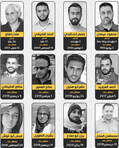8 july 2020

The Palestinian Commission of Detainees’ Affairs has confirmed, on Wednesday morning, the death of an elderly Palestinian political prisoner at Israeli medical center following years of medical neglect.
The Commission stated that Sa’adi Khalil al-Gharabily, 75, from Gaza, has died on Wednesday morning, at an Israeli medical center, after suffering for several years from various health conditions, including cancer.
Qadri Abu Bakr, the head of the Commission, has reported that Israel confirmed his death to one of its lawyers, adding that the detainee died at Kaplan Medical Center.
Although some media outlets have reported his death, Tuesday, the detainee was still in a critical condition hooked life support machines, before he was declared clinically dead, and eventually died.
It is worth mentioning that his family has been denied the right to visit with him since the year 1999.
The Commission called on Israel to transfer his corpse to the Palestinians for an autopsy and a proper burial ceremony.
Former political prisoner, researcher and the head of the Studies and Documentation Committee of the Palestinian Commission of Detainees and Ex-Detainees, Abdul-Nasser Ferwana, has confirmed to the IMEMC the death of al-Gharabily, and stated that the deceased was the second oldest detainee in Israeli prisons, the oldest being Fuad Shobaki, 80.
He added that al-Gharabily was serving a life term in prison after an Israeli court convicted him of killing an Israeli officer in Tel Aviv in the year 1994. He spent most of his sentence in solitary confinement under inhumane conditions, including when he was held in a cell from the year 1994 until 2006.
His death brings the number of detainees, who died or were killed, in Israeli prisons since the year 1967 to 224.
Ferwana stated that 73 detainees died after being continuously and severely tortured, and seven others were shot and killed while in prison, and added that hundreds of Palestinians also died after being released from Israeli prisons after being denied proper and specialized medical treatment while in captivity.
Meanwhile, the Palestinian Prisoners’ Society (PPS) issued a statement denouncing the serious and ongoing Israeli violations against the detainees, including denying them access to specialized medical treatment, in addition to the solitary confinement policies, torture and constant abuse.
The PPS added that at least 700 Palestinian detainees require proper and specialized medical care, but are denied this basic right, and called on forming a nonaligned medical committee that supervises healthcare of ailing detainees, and those with special needs.
It also urged international legal and human rights groups to intervene and provide protection to the Palestinian people, living under the illegal Israeli occupation of their homeland, and to ensure that Israel abides by all related international treaties and conventions.
The Commission stated that Sa’adi Khalil al-Gharabily, 75, from Gaza, has died on Wednesday morning, at an Israeli medical center, after suffering for several years from various health conditions, including cancer.
Qadri Abu Bakr, the head of the Commission, has reported that Israel confirmed his death to one of its lawyers, adding that the detainee died at Kaplan Medical Center.
Although some media outlets have reported his death, Tuesday, the detainee was still in a critical condition hooked life support machines, before he was declared clinically dead, and eventually died.
It is worth mentioning that his family has been denied the right to visit with him since the year 1999.
The Commission called on Israel to transfer his corpse to the Palestinians for an autopsy and a proper burial ceremony.
Former political prisoner, researcher and the head of the Studies and Documentation Committee of the Palestinian Commission of Detainees and Ex-Detainees, Abdul-Nasser Ferwana, has confirmed to the IMEMC the death of al-Gharabily, and stated that the deceased was the second oldest detainee in Israeli prisons, the oldest being Fuad Shobaki, 80.
He added that al-Gharabily was serving a life term in prison after an Israeli court convicted him of killing an Israeli officer in Tel Aviv in the year 1994. He spent most of his sentence in solitary confinement under inhumane conditions, including when he was held in a cell from the year 1994 until 2006.
His death brings the number of detainees, who died or were killed, in Israeli prisons since the year 1967 to 224.
Ferwana stated that 73 detainees died after being continuously and severely tortured, and seven others were shot and killed while in prison, and added that hundreds of Palestinians also died after being released from Israeli prisons after being denied proper and specialized medical treatment while in captivity.
Meanwhile, the Palestinian Prisoners’ Society (PPS) issued a statement denouncing the serious and ongoing Israeli violations against the detainees, including denying them access to specialized medical treatment, in addition to the solitary confinement policies, torture and constant abuse.
The PPS added that at least 700 Palestinian detainees require proper and specialized medical care, but are denied this basic right, and called on forming a nonaligned medical committee that supervises healthcare of ailing detainees, and those with special needs.
It also urged international legal and human rights groups to intervene and provide protection to the Palestinian people, living under the illegal Israeli occupation of their homeland, and to ensure that Israel abides by all related international treaties and conventions.
7 july 2020

The Israeli Prison Service has not yet officially informed the Palestinians or the Red Cross of the death of a Palestinian detainee in prison, while the current information reveals that the detainee is likely clinically dead, but so far, there has been no official confirmation, despite various conflicting reports.
Former political prisoner, researcher and the head of the Studies and Documentation Committee of the Palestinian Commission of Detainees and Ex-Detainees, has informed the International Middle East Media Center (IMEMC) that the Israeli Prison Service has not informed any party that the detainee, Sa’ad al-Gharabily, 75, has died, and only announced he is in a critical condition, or possibly clinically dead.
Ferwana added that his department is still awaiting an official confirmation about the detainee’s condition, and held Israel fully responsible for his life, especially amidst the lack of proper medical treatment to the detainees.
“We can only hope that al-Gharabily is alive, and we wish him a full recovery; we also hold Israel fully responsible for what happens to him,” Ferwana told the IMEMC, “All that we know, especially since Israel is not providing much information, is that the detainee is still alive, but in a very critical condition.”
It is worth mentioning that al-Gharabily is from the Gaza Strip, and was taken prisoner in the year 1994, before he was sentenced to life in prison after being convicted of participating in attacks against Israeli occupation targets.
Ferwana voiced an appeal to media outlets to refrain from publishing unconfirmed reports, that are largely conflicting and only cause more agony and suffering to the families of the detainees.
His statements came after various media outlets, journalists and activists, published reports, or posts, claiming the detainee has died in prison, even though no official confirmation was ever made.
“The issue of the detainees is a humanitarian cause; it is not a subject for media outlets to deal with it as breaking news, competing on who publishes first before all others,” Ferwana told the IMEMC, “Media outlets and social media activists must be aware of the facts, and should never publish such reports before they are officially confirmed or denied.”
“It is already always difficult to get any news from the Israeli prisons, detention centers, and interrogation facilities. Israel’s lack of cooperation with human rights groups and the Red Cross, makes getting such news nearly impossible,” Ferwana said, “I call on all individuals, media outlets, officials, institutions, and political factions to refrain from making statements and publishing hasty reports without official confirmations. We also need to always respect the families, and what they go through in these conditions.”
“A martyr is not a number, is not a new breaking news item; we need to wait; we need to confirm before we make official statements and issue press releases,” Ferwana concluded, “to those who just want to publish, those who claim to know the full truth, if I could whisper in their ears, I would say please have compassion and respect to the feelings of others, respect the people, respect their minds, and then, they will respect you back.”
Former political prisoner, researcher and the head of the Studies and Documentation Committee of the Palestinian Commission of Detainees and Ex-Detainees, has informed the International Middle East Media Center (IMEMC) that the Israeli Prison Service has not informed any party that the detainee, Sa’ad al-Gharabily, 75, has died, and only announced he is in a critical condition, or possibly clinically dead.
Ferwana added that his department is still awaiting an official confirmation about the detainee’s condition, and held Israel fully responsible for his life, especially amidst the lack of proper medical treatment to the detainees.
“We can only hope that al-Gharabily is alive, and we wish him a full recovery; we also hold Israel fully responsible for what happens to him,” Ferwana told the IMEMC, “All that we know, especially since Israel is not providing much information, is that the detainee is still alive, but in a very critical condition.”
It is worth mentioning that al-Gharabily is from the Gaza Strip, and was taken prisoner in the year 1994, before he was sentenced to life in prison after being convicted of participating in attacks against Israeli occupation targets.
Ferwana voiced an appeal to media outlets to refrain from publishing unconfirmed reports, that are largely conflicting and only cause more agony and suffering to the families of the detainees.
His statements came after various media outlets, journalists and activists, published reports, or posts, claiming the detainee has died in prison, even though no official confirmation was ever made.
“The issue of the detainees is a humanitarian cause; it is not a subject for media outlets to deal with it as breaking news, competing on who publishes first before all others,” Ferwana told the IMEMC, “Media outlets and social media activists must be aware of the facts, and should never publish such reports before they are officially confirmed or denied.”
“It is already always difficult to get any news from the Israeli prisons, detention centers, and interrogation facilities. Israel’s lack of cooperation with human rights groups and the Red Cross, makes getting such news nearly impossible,” Ferwana said, “I call on all individuals, media outlets, officials, institutions, and political factions to refrain from making statements and publishing hasty reports without official confirmations. We also need to always respect the families, and what they go through in these conditions.”
“A martyr is not a number, is not a new breaking news item; we need to wait; we need to confirm before we make official statements and issue press releases,” Ferwana concluded, “to those who just want to publish, those who claim to know the full truth, if I could whisper in their ears, I would say please have compassion and respect to the feelings of others, respect the people, respect their minds, and then, they will respect you back.”
6 july 2020

Sa’di al-Gharabli, 75
Palestinian prisoner Sa’di al-Gharabli, 75, died on Monday afternoon at Israel’s Eshel Prison due to deliberate medical neglect.
Al-Gharabli, a resident of Shijaiya neighborhood in Gaza who was serving a life sentence, spent 26 years in Israeli jails.
Al-Gharabli was arrested in 1994 and spent about 15 years of his detention in solitary confinement.
According to al-Gharabli’s family, who met him for the last time in 2001 before the Israel Prison Service decided to deprive him of family visits, al-Gharabli was deliberately denied treatment for prostate cancer and other chronic diseases.
Although his health condition gravely deteriorated in recent weeks, the Israel Prison Service refused to move him to the Ramle Prison Clinic and left him to suffer until he took his last breath.
Al-Gharabli’s death brought the number of Palestinians who have died while in Israeli custody since 1967 to 223. This is added to hundreds of prisoners who died after their release from Israeli jails due to illnesses and injuries they sustained during their detention.
Palestinian prisoner Sa’di al-Gharabli, 75, died on Monday afternoon at Israel’s Eshel Prison due to deliberate medical neglect.
Al-Gharabli, a resident of Shijaiya neighborhood in Gaza who was serving a life sentence, spent 26 years in Israeli jails.
Al-Gharabli was arrested in 1994 and spent about 15 years of his detention in solitary confinement.
According to al-Gharabli’s family, who met him for the last time in 2001 before the Israel Prison Service decided to deprive him of family visits, al-Gharabli was deliberately denied treatment for prostate cancer and other chronic diseases.
Although his health condition gravely deteriorated in recent weeks, the Israel Prison Service refused to move him to the Ramle Prison Clinic and left him to suffer until he took his last breath.
Al-Gharabli’s death brought the number of Palestinians who have died while in Israeli custody since 1967 to 223. This is added to hundreds of prisoners who died after their release from Israeli jails due to illnesses and injuries they sustained during their detention.
3 may 2020

Marking the World Press Freedom Day, which coincides on May 3 every year, the Palestinian Prisoner's Society (PPS) said today that 12 Palestinian journalists are currently held behind Israeli prison bars.
It said the longest serving of these 12 journalists are Mahmoud Essa (three life sentences and 45 years), Basem Khendoggi (three life sentences in prison), Munther Mefleh (30 years) and Ahmad Saifi (17 years).
In addition, the PPS said some of these 12 journalists are held in Israeli detention without charge or trial, based on what the Israeli intelligence describes as the "secret file".
"The occupation authorities have pursued the policy of arresting journalists and activists in an attempt to undermine their societal, cultural and political role, and prevent them from revealing the crimes of the occupation," the PPS said on this occasion.
Detention of journalists by Israeli occupation authorities have been on the rise since 2015, when Israeli courts started to use the pretext of "incitement" to justify the detention of journalists and the closure of TVs and media institutions under military orders.
It said the longest serving of these 12 journalists are Mahmoud Essa (three life sentences and 45 years), Basem Khendoggi (three life sentences in prison), Munther Mefleh (30 years) and Ahmad Saifi (17 years).
In addition, the PPS said some of these 12 journalists are held in Israeli detention without charge or trial, based on what the Israeli intelligence describes as the "secret file".
"The occupation authorities have pursued the policy of arresting journalists and activists in an attempt to undermine their societal, cultural and political role, and prevent them from revealing the crimes of the occupation," the PPS said on this occasion.
Detention of journalists by Israeli occupation authorities have been on the rise since 2015, when Israeli courts started to use the pretext of "incitement" to justify the detention of journalists and the closure of TVs and media institutions under military orders.
